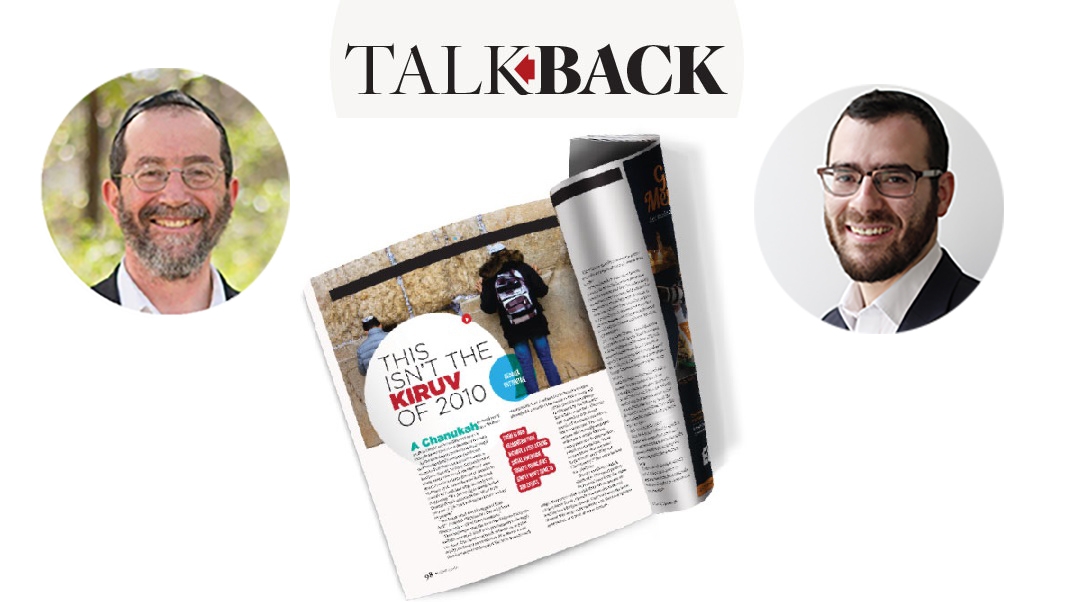Which Extreme Comes First?

T

I wonder if the behavior of these striving bochurim is not a result of psychotic illness but rather the cause. In other words, the bochur is, essentially, about as healthy as anyone else. He just has a great yearning toward extreme greatness. So he follows a regimen that many, many great people in previous generations followed to achieve their superhuman greatness. It worked for these giants because they had strong bodies and psyches, and radiant souls. When they denied their bodies, their psyches didn’t break down, but were humbled and allowed their souls to shine through.
The problem is that when today’s seekers follow this regimen, they fall into serious mental illness. Their psyches aren’t merely humbled but seriously damaged.
The Baal Shem Tov abolished the practice of sigufim, self-inflicted punishment as a means for self-purification, because he realized that current generations were too weak. In later years, tzaddikim discouraged even more minor forms of self-affliction, such as sleep deprivation and denying oneself adequate food.
As we get weaker and weaker, we even see that denying oneself emotional and mental relaxation in the form of fun and pleasure leads not to tzidkus, but to psychosis. I know of at least two precious boys who tried the traditional high path to greatness and, tragically, now struggle with mental illness, a manifestation of the “shvache gufim” seforim mention when they discourage denying the body its needs.
Just my musings… I wonder what Dr. Freedman says.
B.V., Brooklyn NY
Dr. Freedman responds:
Many people push themselves too hard. Many parents push their kids too hard. Many rebbeim push their bochurim too hard.
As a system and a community, we need to be more thoughtful of the messages — both explicit and implicit — that our adolescent children are given as far as reasonable spiritual goals. Learning a bit during bein hazmanim is good; never going hiking or swimming during bein hazmanim isn’t particularly healthy. Avoiding the temptation to waste time online during bein hasedorim is good; never “chilling” because it’s bittul zeman is a bit too restrictive for most bochurim.
That being said, most kids who are pushed too hard don’t gravitate toward continued taanis dibbur and sleeping three hours per night with other psychotic symptoms. Serious mental illnesses like OCD, bipolar disorder, and schizophrenia are caused by a genetic predisposition that is ignited by stress (e.g., drugs, alcohol, family, financial, academic pressures). For this population, a healthy lifestyle and decreased stress are not enough to guarantee mental health. Psychiatric treatment — with or without pharmaceutical treatment, depending on the severity of symptoms — is also necessary in addressing mental illness. Denying this fact to young men and their families puts people at a greater risk of relapse and limits their possibility of a full recovery.
That said, most young men who are pushed too hard by themselves and others will not end up with a serious mental illness. Instead, they will come to view ruchniyusdig pursuits as an insufferable chore, and it’s likely that they’ll develop problems with anger, frustration, anxious feelings, and depressed mood. In order to deal with these emotions, they’ll find all sorts of things that we try to protect them from, like drugs and alcohol. They’ll start exploring other lifestyles that aren’t particularly heimish, and the Internet will be the least of everyone’s worries.
In short: too much spiritual pressure isn’t a good thing for the vast majority of young men. For some bochurim it will ignite the fires of mental illness, for others it will force them off the derech.
If there’s one thing I’ve learned from working with kids who suffered and struggled through the system — whether it’s as part of a team with Rabbi Yoni Fischer and Rabbi Shmuel Luger, The Mash and Rav Yitzi Tendler at Neve, Rabbi Chananya Greenwald and Rav Adam Schwartz at TJ, or Rabbi Nachi Brickman at Derech — it’s that love and sincere guidance work a lot better than pressure and guilt.
We should all work on putting this into practice.
(Originally featured in Mishpacha, Issue 796)
Oops! We could not locate your form.




